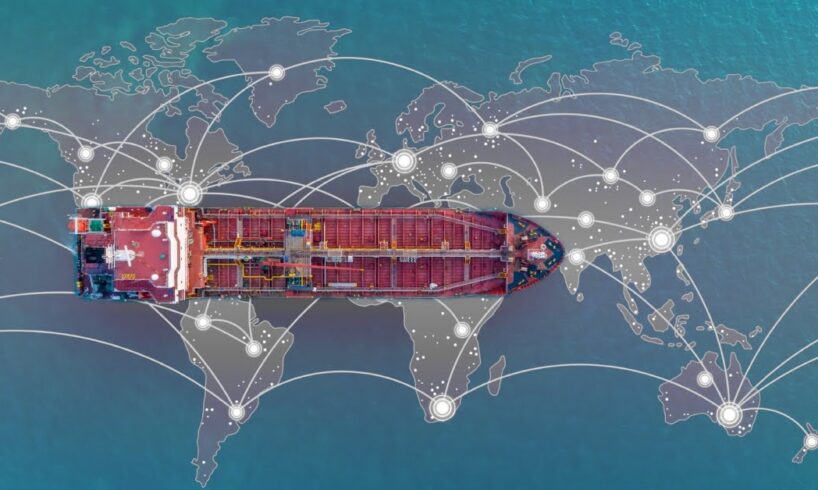
[This is a sponsored article with IMDA.]
Global trade hit a record US$33 trillion in 2024. That same year, Singapore, one of the world’s largest trading hubs, saw over 130,000 vessels calling at its ports, with total merchandise trade reaching S$1,285.9 billion.
It’s clear that global trade is now moving faster than ever, yet a surprising bottleneck remains: the majority of trade documents are still paper-based.
This includes Bills of Lading (BLs): essential documents that prove ownership of goods, allow shipments to be financed, and serve as the legal receipt for cargo. BLs require multiple parties—banks, carriers, importers, and exporters—to print, stamp, and sign various paper copies, which are then physically transported across countries, often via air express.
Image Credit: IMDA
According to a recent ICC Alliance survey, while 42% of firms now use a mix of paper and digital BLs, only a mere 7.5% have gone fully electronic.
The vast majority continue to rely on manual processes, resulting in slower shipments and higher costs. On top of that, lost paperwork or errors could create legal risks, trigger disputes over ownership, and delay payments.
These inefficiencies could directly impact a business’s operational efficiency and competitiveness.
Recognising these challenges, the Infocomm Media Development Authority (IMDA) developed TradeTrust, a digital framework designed to streamline cross-border trade documents, provide legal certainty, and prepare businesses for the next phase of digital trade.
The “Internet” of trade documents
TradeTrust allows businesses to securely generate, exchange, and authenticate trade documents digitally across different platforms and countries.
Image Credit: IMDA
By leveraging blockchain technology, the platform transforms documents such as electronic Bills of Lading (eBLs) into verifiable, tamper-evident digital records known as Electronic Transferable Records (ETRs). This eliminates the need for a central authority, ensuring neutrality and impartiality for all parties involved.
TradeTrust currently integrates with public blockchains such as Ethereum, Polygon, Stability, and XDC, and uses non-fungible tokens (NFTs) to securely transfer ownership of ETRs.
eBLs generated through TradeTrust also comply with the UNCITRAL Model Law on Electronic Transferable Records (MLETR), a legal framework developed by the United Nations Commission on International Trade Law that recognises electronic trade documents as legally equivalent to their paper counterparts.
Documents can be generated with a QR code, which can be printed and shared. Scanning the code lets recipients immediately retrieve and verify the digital file, enabling seamless switching between paper and digital formats. This flexibility ensures that all parties in a supply chain regardless of their technological maturity can participate, supporting widespread adoption and scalability.
With its open-source code, TradeTrust can be easily integrated into the systems of businesses and service providers. Rather than competing with service providers, TradeTrust acts as an enabler, helping them extend their reach, connect with more businesses, and serve a broader trading community.
In essence, it functions as the “Internet” of trade documents, connecting multiple platforms and making global trade faster, safer, and more efficient.
Getting businesses ready for the next phase of digital trade
TradeTrust transforms manual paperwork that used to take hours into tasks that can now be accomplished in minutes. Partners using TradeTrust-enabled Digital Trade Platforms span the shipping, supply chain, IT, and finance industries.
Image Credit: IMDA
In Singapore, commodities trader Maptrasco leverages a TradeTrust-ready Digital Trade Platform to issue eBLs. Before, sending cargo documents across countries could take weeks, with delays and extra costs from couriers.
Now, documents are verified digitally, and ownership can be transferred instantly to banks for financing. Maptrasco has cut what used to take about a month down to just 10 days, freeing up cash and letting the company focus on growth.
This is partly thanks to the shift from paper to eBLs, which reduced BL processing time from 16.4 hours to just 4 minutes and 30 seconds.
In markets where MLETR has not yet been fully adopted into law like China, businesses can still leverage TradeTrust-enabled digital documents through Digital Trade Platforms, even when operating across different digital trade infrastructures.
Earlier this year, Beijing and Singapore launched the world’s first interoperable digital “Documents against Payment” trade system, using TradeTrust-enabled eBLs to replace traditional paper processes.
The project involved COFCO Industrial Food (China), Yit Hong Pte Ltd (Singapore), shipping company Pacific International Lines (PIL), and major banks from both countries to ship canned food containers to Singapore via sea freight.
Image Credit: IMDA
By digitising trade documents, the project cut document handling times dramatically: what used to take weeks can now be done in minutes or days. Payments were also accelerated, with COFCO reporting a drop from 20 days to just five for shipment-to-payment settlement.
Banks reduced verification steps and costs, while companies avoided risks like lost or tampered documents.
This demonstrates how TradeTrust is helping companies not just improve efficiency, but also get ready for the next phase of digital trade.
A trusted framework for global trade
Whether it’s eBLs, certificates of origin, or electronic promissory notes, TradeTrust is a framework that allows global trade to move seamlessly and securely across borders, platforms, and regulatory frameworks.
In Mar 2025, IMDA further launched TradeTrust Model Terms for eBLs, giving businesses confidence that their digital documents would be legally and commercially accepted across borders.
TradeTrust’s impact has been recognised internationally, receiving the World Summit Award (WSA) in 2023 for its innovation-driven contribution to digital trade.
It also recently received recognition as a Digital Public Good by the United Nations-endorsed Digital Public Goods Alliance, and was featured by the World Customs Organisation as a trusted framework for global trade.
Beyond its international recognition and impact, TradeTrust holds deep strategic importance for Singapore itself. It is more than just technology—it is a national capability that anchors the country’s position as a trusted hub of global commerce and strengthens enterprise competitiveness from SMEs to multinationals.
Ultimately, TradeTrust reflects Singapore’s ambition to contribute standards that will power tomorrow’s economy, ensuring the nation remains a reliable partner in global trade flows in the digital age.
If your business is still relying on paper BLs, it’s time to move into the digital era. Explore TradeTrust here and see how it can transform the way your business trades globally.
Featured Image Credit: Darunrat Wongsuvan/ Shutterstock.com





